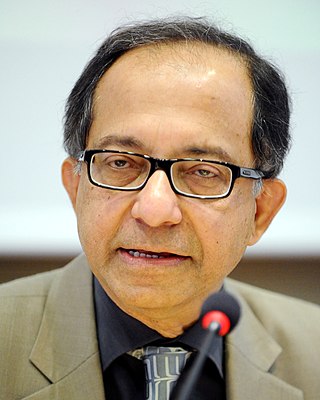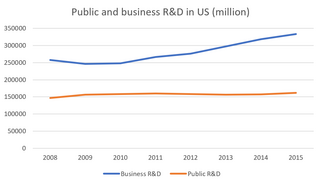
Sir James Alexander Mirrlees was a British economist and winner of the 1996 Nobel Memorial Prize in Economic Sciences. He was knighted in the 1997 Birthday Honours.

Dani Rodrik is a Turkish economist and Ford Foundation Professor of International Political Economy at the John F. Kennedy School of Government at Harvard University. He was formerly the Albert O. Hirschman Professor of the Social Sciences at the Institute for Advanced Study in Princeton, New Jersey. He has published widely in the areas of international economics, economic development, and political economy. The question of what constitutes good economic policy and why some governments are more successful than others at adopting it is at the center of his research. His works include Economics Rules: The Rights and Wrongs of the Dismal Science and The Globalization Paradox: Democracy and the Future of the World Economy. He is also joint editor-in-chief of the academic journal Global Policy.
The Royal Economic Society (RES) is a professional association that promotes the study of economic science in academia, government service, banking, industry, and public affairs. Originally established in 1890 as the British Economic Association, it was incorporated by royal charter on December 2, 1902. The Society is a charity registered with the U.K. Charity Commission under charity number 231508.

Michael Jay Boskin is the T. M. Friedman Professor of Economics and senior Fellow at Stanford University's Hoover Institution. He also is chief executive officer and president of Boskin & Co., an economic consulting company.
Econometric Theory is an economics journal specialising in econometrics, published by Cambridge Journals. Its current editor is Peter Phillips. It is one of the main econometrics journals.

Kaushik Basu is an Indian economist who was Chief Economist of the World Bank from 2012 to 2016. He is the C. Marks Professor of International Studies and Professor of Economics at Cornell University, and academic advisory board member of upcoming Plaksha University. He began a three-year term as President of the International Economic Association in June 2017. From 2009 to 2012, during the United Progressive Alliance's second term, Basu served as the Chief Economic Adviser to the Government of India. Kaushik Basu is winner of the Humboldt Research Award 2021.

The ease of doing business index was an index created jointly by Simeon Djankov, Michael Klein, and Caralee McLiesh, three leading economists at the World Bank Group, following the release of World Development Report 2002. The academic research for the report was done jointly with professors Edward Glaeser, Oliver Hart, and Andrei Shleifer. Though the first report was authored by Djankov, Klein, and McLiesh, and they continue to be listed as "founders" of the report, some sources attribute the genesis of the idea to Djankov and Gerhard Pohl. Higher rankings indicated better, usually simpler, regulations for businesses and stronger protections of property rights. Empirical research funded by the World Bank to justify their work show that the economic growth effect of improving these regulations is strong.
The Journal of Political Economy is a monthly peer-reviewed academic journal published by the University of Chicago Press. Established by James Laurence Laughlin in 1892, it covers both theoretical and empirical economics. In the past, the journal published quarterly from its introduction through 1905, ten issues per volume from 1906 through 1921, and bimonthly from 1922 through 2019. The editor-in-chief is Magne Mogstad.

Joel Mokyr is a Netherlands-born American-Israeli economic historian. He is a professor of economics and history at Northwestern University, where he has taught since 1974; in 1994 he was named the Robert H. Strotz Professor of Arts and Sciences. He is also a Sackler Professorial Fellow at the University of Tel Aviv's Eitan Berglas School of Economics.

The Journal of Economic Dynamics and Control(JEDC) is a peer-reviewed scholarly journal devoted to computational economics, dynamic economic models, and macroeconomics. It is edited at the University of Amsterdam and published by Elsevier. It has been published since 1979.

The Annual Review of Economics is a peer-reviewed academic journal that publishes an annual volume of review articles relevant to economics. It was established in 2009 and is published by Annual Reviews. The co-editors are Philippe Aghion and Hélène Rey.
The American Economic Journal is a group of four peer-reviewed academic journals published by the American Economic Association. The names of the individual journals consist of the prefix American Economic Journal with a descriptor of the field attached. The four field journals which started in 2009 are Applied Economics, Economic Policy, Macroeconomics, and Microeconomics.
The Journal of Supply Chain Management is a quarterly peer-reviewed academic journal that was established in 1965. The journal covers supply chain management, operations management, marketing, strategic management, and social network analysis. It is published by Wiley-Blackwell and the editors-in-chief are Wendy L. Tate, Andreas Wieland, and Tingting Yan.
The Journal of Economic Growth is a peer-reviewed academic journal covering research in economic growth and dynamic macroeconomics. It was established in 1996 and is published by Springer Science+Business Media. The journal deals with both theories and their empirics, and examines the entire array of subject areas in economic growth, including neoclassical and endogenous growth models, growth and income distribution, human capital, fertility, trade, development, migration, money, the political economy, endogenous technological change, overlapping-generations models, and economic fluctuations.

Carlos A. Végh is a Uruguayan academic economist who, since 2013, is the Fred H. Sanderson Professor of International Economics at the Johns Hopkins School of Advanced International Studies (SAIS), and holds a joint appointment with Johns Hopkins' Department of Economics. He is also a research associate at the National Bureau of Economic Research since 1998. He was the World Bank Chief Economist for Latin America and the Caribbean from February 1, 2017 to June 30, 2019, while on leave from Johns Hopkins. He was previously a Professor of Economics and Vice-Chair of Undergraduate Studies at UCLA (1996-2005) and Professor of Economics at the University of Maryland (2005-2013). His research work on monetary and fiscal policy in emerging and developing countries has been highly influential in both academic and policy circles. In particular, his work on fiscal procyclicality in emerging markets has been instrumental in generating a copious literature on the subject, which has influenced the adoption of fiscal rules in many emerging markets.
Panicos Onisiphorou Demetriades in Limassol, Cyprus, is a Cypriot economist, currently Professor of Financial Economics at the University of Leicester. During 3 May 2012 - 10 April 2014, Demetriades was a European Central Bank Governing Council member and the Governor of the Central Bank of Cyprus. According to RePEC he is in the top 2% of economic authors in Europe. He is the author of "A Diary of the Euro Crisis in Cyprus: Lessons for Bank Recovery and Resolution", published by Palgrave Macmillan in 2017.
The Review of Black Political Economy is a quarterly peer-reviewed academic journal established in 1970 publishing research on the economic status of African-Americans, the African diaspora, and other non-white marginalized populations. It is affiliated with the National Economic Association and is published by SAGE Publishing. Individual memberships can be acquired through membership in the National Economic Association or through direct subscription.. The journal focuses on research that can inform policies to reduce racial, gender, and ethnic economic inequality. The journal is also a member of the Committee on Public Ethics (COPE).

The Portuguese Economic Journal is a triannual peer-reviewed academic journal of economics. It is published by Springer Science+Business Media on behalf of ISEG, University of Lisbon and the editor-in-chief is Luís F. Costa (ISEG). The journal was established in 2002 with Paulo Brito as its founding editor-in-chief. The journal organizes an annual meeting, held at different Portuguese universities.

The Socio-Economic Review (SER) is a peer-reviewed academic journal, published quarterly by Oxford Journals for the Society for the Advancement of Socio-Economics (SASE). It is a journal dedicated to the analytical, political and moral questions arising at the intersection between economy and society. Next to double-blind reviewed articles, SER publishes review symposia, discussion forums, presidential addresses as well as editorials.

Public research and development refers to the R&D activities related to public sectors, including governments, colleges and non-profit organizations. Public R&D include academic fundamental research, applied research and R&D grants and contracts to private sectors, where later two are known as 'R&D subsidy'. Public R&D could be understood as a funder or a performer of an R&D activity. According to National Science Foundation in U.S., in 2015, R&D expenditures performed by federal governments, local governments, colleges and non-profit organizations are 54, 0.6, 64, and 20 billions of dollars, respectively. Meanwhile, industries perform R&D expenditures of 356 billion dollars. Moreover, R&D expenditures funded by federal governments, local governments, colleges and non-profit organizations are 121, 4.3, 17, and 19 billions of dollars, respectively. R&D expenditures funded by industries are 333 billion dollars. In terms of R&D funders, public R&D to private R&D ratio is about 0.5.












